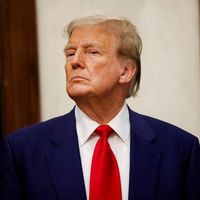Iran-US Relations Key to Challenges Facing the Next Iranian President
Iran's relations with the United States appear to be at the heart of the country's plethora of issues, as highlighted by state television and the Supreme Leader Ali Khamenei's selection of six candidates to replace former President Ebrahim Raisi.
The last two rounds of presidential election debates, aired on state television on Monday and Tuesday, revealed a consensus among all candidates. They agreed that the nation's most urgent expectation from the government and the new President is to solve the financial problems that have persisted for many years, especially since 2018.
The next most urgent expectation appears to be the lifting of sanctions.
Both of these expectations are fundamentally related to the country's foreign policy crisis, and more accurately regarding Iran's ties with the US.
While broadcasting the monologues that state TV claims are "debates" among the candidates, the broadcaster stated that viewers have indicated the most urgent problems they expect the next president to solve are, in order of significance:
- Economic problems 73.5%
- Improving situation of welfare 26%
- Tackling unemployment 25.7%
- Tackling financial corruption 25.6%
- Improving relations with other countries 19.3%
- Lifting the sanctions 15.7%
- Lifting the filtering [on the Internet] 6.6%
- Negotiating with the United States 6.5%
- Easing dress code enforcement 5.8%
- Reducing cost of medical treatment 5.1%
- Other 4.4%
- No response 3%
Among these expectations, economic and financial demands include solving economic problems, improving welfare, reducing unemployment, addressing financial corruption, and lowering the cost of medical treatment.
On the other hand, the expectations of lifting sanctions and negotiating with the US pertain to foreign policy and relations with the US.
Obviously, the improvement of the financial situation depends on resolving foreign policy issues and maintaining ties with the US. The mention of improving relations with "other countries" is also a euphemism for resuming ties with the US.
Lifting internet filtering and easing the enforcement of the dress code (hijab) are two social issues that highlight the difference between the lifestyle the nation prefers and the one dictated by Islamic ideology.
Nearly all the candidates, even the most anti-US one, Saeed Jalili, agreed in their remarks on state television that negotiations with Washington are necessary, even if former President Donald Trump returns to power.
In the meantime, many were misled to believe that a 2019 video of Trump speaking during a news conference with the Japanese leader indicated a new development, suggesting Trump was eager to maintain ties with the current leadership of the Islamic Republic.
Some netizens went so far as to suggest that the US leadership does not care about Iranians' political demands and is ready to compromise. Iranian leaders seemed pleased with this incorrect conclusion, which was based on fake news.
Some social media users opined, however, that it was most certainly not possible for Khamenei to allow a compromise with Trump, given that he was the man who ordered the killing of former Islamic Revolutionary Guards Quds Force Commander Qasem Soleimani.
Be that as it may, the call made by all six candidates for negotiating with the US was in sharp contradiction with Supreme Leader Khamenei, who said on Tuesday that candidates should not turn to the United States and should instead do business with Russia and China.
If the candidates are serious about negotiating with the US to improve the populace’s financial situation, they need to think twice if they wish to remain loyal and obedient to Khamenei.
This would also indicate that Iran’s relations with the US are likely to remain a central dilemma for the Islamic Republic's problems for at least another four years.







